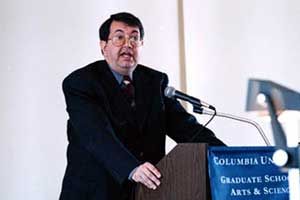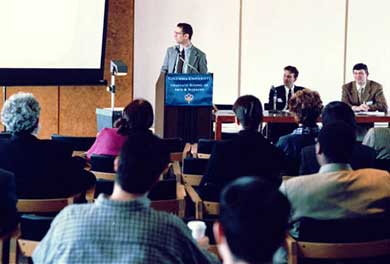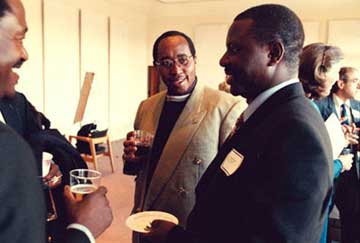
|
|
Dr. Howard Silver, Executive Director of the Consortium of Social Science Associations in Washington, DC, tied the themes of the conference together in his keynote address, "Data Needs in the Social Sciences."
|
How can we measure the magnitude and severity of poverty? Will the internet make global data available globally? How do the mass media create shifts in public opinion? What is the responsibility of the social scientist in furthering democracy and social justice?
These and other questions were raised at a Columbia University conference on March 31, 2000, entitled "Information and Democratic Society: How to Represent and Convey Quantitative Data."
The role that social scientists can play in fostering democracy and tackling global issues such as poverty and health care is strongly affected by their ability to collect, interpret and communicate data accurately. The conference, co-sponsored by the Graduate School of Arts and Sciences (GSAS), the School of International and Public Affairs (SIPA), and Columbia's Institute for Social and Economic Theory and Research (ISETR) provided a forum for scholars grappling with research methods to meet and exchange ideas.

|
|
Prof. Andrew Gelman (left) Statistics, leads a panel describing the new Quantitative Methods in the Social Sciences M.A. program as panelists Prof. Greg Wawro (center) Political Science and Ph.D. Candidate, Stephan Danninger, Economics, look on.
|

|
|
Peter Dzvimbo (left), Vice-Chancellor of Zimbabwe Open University, Adam Mugume (center), Professor of Economics at Makerere University in Uganda, and Oliver Saasa Saasa, Professor of Economics at the University of Zambia, discuss data needs in Africa during the post-conference reception.
|
Nearly 100 social scientists from Argentina, Brazil, China, Colombia, Poland, Uganda, the United States, Zambia and Zimbabwe discussed social science problems, data availability and accuracy, and research methods in their countries. Dr. Howard Silver, Executive Director of the Consortium of Social Science Associations, discussed 21st century data needs in the social sciences. Researchers from Columbia University presented data and discussed topics ranging from market systems to survey respondent confidentiality, from program evaluation to public opinion. The Center for International Earth Science Information Network (CIESIN), now based at Columbia, demonstrated the Internet's potential for making global data available globally. Lisa Anderson, dean of the School of International & Public Affairs at Columbia, closed the conference with an investigation of the role that social science research can and should play in fostering and sustaining peace, prosperity and freedom.
The conference also included a discussion about future directions for Columbia's new M.A. Program in Quantitative Methods in the Social Sciences.
The conference was supported by a generous grant from The Ford Foundation.
Scholars who wish further information about the conference may contact Cynthia van Ginkel, assistant dean for Columbia M.A. Programs, at 212/854-5972 or cev26@columbia.edu.
|
